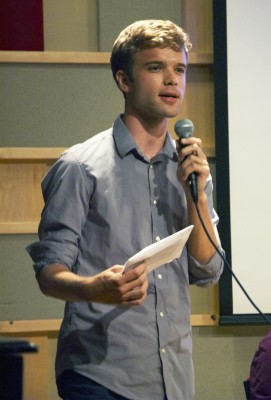
For a concert examining the intersection of music and violence, one might envision a thrash metal performance from the likes of Slayer or a jazz collective in which a bayonet substitutes a bassoon.
Fear not. Feb. 13, the John Knowles Paine Concert Hall at Harvard University will host The Myth of Modern Violence, assembled by performance collaborative Project LENS, featuring psychologist Steven Pinker and the Grammy Award-winning Parker Quartet. Though it will not provoke violence of any sort, this presentation, synthesizing musical performances and lectures, will instead offer an intriguing perspective invalidating conventional theories about the increase in violent music over the course of history.
“While on a grand scale of human society, violence is going down, there is still a notion that music has become increasingly violent,” said Rainer Crosett, co-founder of Project LENS. “The goal of this event is to debunk this myth about contemporary being more violent.”
Project LENS, a performance art collective based in Boston, consists of three core members: cellists Crosett and Alan Toda-Ambaras and violinist Ariel Mitnick. All former classmates at Harvard, studying seemingly divergent subjects such as neurobiology and philosophy, the three created Project LENS, Crosett said, out of their various perspectives, with the mission of entwining music with a wide assortment of global topics.
“Our events interweave classical pieces and works from classical repertoire and discuss how this music relates to another topic,” Crosett said. “The speaker we bring in will try to come to some sort of understanding of both the music and the idea outside the music.”
The events are part-TED talk-style discussions and part-performance, blending two “threads” throughout each performance, said Mitnick, another Project LENS co-founder.
“Our hope is to reveal something new about the music component, which we call the music thread, and the speaking component, which we call the talk thread,” Mitnick said.
For The Myth of Modern Violence, Project LENS will be collaborating with Pinker, who will discuss his book of the same name. In it, Pinker explores the decline of physical violence over the last four millennia of human history.
The collective will use Pinker’s book as a jumping-off point to analyze violence in classical pieces, ultimately affirming that music has not grown increasingly violent over the years, but has been jarring for quite some time, Mitnick said.
“While classical music as you know it essentially takes place over the last 400 years, there’s still this perception that over time, it has become increasingly violent,” Mitnick said. “We want to debunk that myth and show that violence is a pervasive facet of music, a thing that composers have written about for all of the last 400 years.”
By typically associating classical music with composers such as Wolfgang Amadeus Mozart, Ludwig van Beethoven and Johann Sebastian Bach, Crosett said, it has been quite common for people to assume that contemporary music is more dissonant.
Project LENS hopes to reveal the ways in which composers throughout history have evoked violence through polyrhythmic structures and polyphonic writing. Going as far back as the 17th century to explore the ways Franz Schubert was able to evoke violence within his time period, to Dmitri Shostakovich in the 20th century, up to the modern day David Friedman, the performance will shed light on the trajectory of classical music and the prevalence of violence through its lifespan.
The Parker Quartet, artists-in-residence at Harvard, will play alongside Project LENS during a portion of the program.
“This is one way we are an entry point into Steven Pinker’s ideas,” Crosett said. “We are also interested in exploring other ways music and his research relate. For example, ideas about how globalization allowed composers to have greater knowledge about wars and acts of violence.”
The Myth of Modern Violence will start at 7:30 p.m. on Feb. 13 in Harvard University’s John Knowles Paine Concert Hall.




